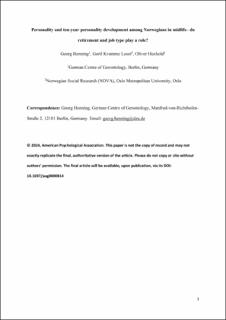| dc.description.abstract | Our personality develops over the whole lifespan and in particular when our life circumstances change. Retirement is a life event that brings changes in identity, day structures, and social roles of former workers. Therefore, it may affect personality traits such as the Big Five (neuroticism, extraversion, intellect, conscientiousness, and agreeableness). Previous studies have shown conflicting results concerning the question whether and how retirement is associated with changes in personality traits. Furthermore, there is little knowledge about the role of the job people leave behind when retiring. In the present study, we compared personality development over a 10-year period, based on two waves of a Norwegian survey, between retiring and continuously working blue-collar versus white-collar workers (n = 1,263, Mage = 56.58). Latent change score models showed that neuroticism and openness declined in the sample, but to a comparable degree in all groups. We further found differences in baseline personality traits between blue-collar workers and white-collar workers, as well as between those retiring and not retiring, implying selection into retirement by personality traits. Item level analyses showed declines in some items. We discuss theoretical and methodological implications of our results in light of previous ambiguous findings and emphasize the possible heterogeneity across retirees. | en_US |
